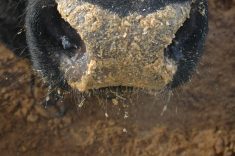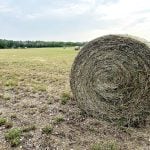A clutch of Canadian organic producers has signed on with a long list of mostly U.S. farm plaintiffs to “pre-emptively” sue Monsanto against any chance that the company could sue them over patent infringement.
Ottawa-based Canadian Organic Growers (COG), along with 20 other farm groups, 12 seed businesses and 26 individual farmers and farms, filed March 29 in a U.S. District Court in New York City.
The suit, the plaintiffs claim, is “to protect themselves from being accused of patent infringement should their crops ever become contaminated by Monsanto’s genetically modified seed.”
Read Also

Alberta harvest wrapping up: report
Harvest operations advanced to 96 per cent complete in Alberta as of Oct. 7, with only a few late-seeded cereal and canola fields remaining, according to the latest provincial crop report.
“This case asks whether Monsanto has the right to sue organic farmers for patent infringement if Monsanto’s transgenic seed or pollen should land on their property,” said Dan Ravicher of the Public Patent Foundation (PUBPAT), a New York-based foundation representing the plaintiffs.
“It seems quite perverse that an organic farmer contaminated by transgenic seed could be accused of patent infringement,” he said, but Monsanto “is notorious for having sued hundreds of farmers.”
Monsanto retorted March 29 in a company blog, describing allegations in the suit as “false, misleading and deceptive.
“It has never been, nor will it be Monsanto policy to exercise its patent rights where trace amounts of our patented seed or traits are present in (a) farmer’s fields as a result of inadvertent means,” the company said.
PUBPAT’s statement of claim retorted back that Monsanto’s commitment on that point “does not define what is meant by ‘trace amounts’ or ‘inadvertent means.'”
Therefore, the plaintiffs allege, “the clear message is that Monsanto indeed intends to assert its transgenic seed patents against certified organic and nontransgenic seed farmers who come to possess more than ‘trace amounts’ of Monsanto’s transgenic seed, even if it is not their fault.”
“Publicity stunt”
Between 1997 and April 2010, the PUBPAT suit claims, Monsanto filed 144 lawsuits against farmers in at least 27 different states for alleged infringement of its transgenic seed patents and/or breach of its license to those patents.
Among farmers who the suit claims “did not want to be contaminated by transgenic seed” but had been sued by Monsanto, the only Canadian farmer PUBPAT’s claim mentions by name is Saskatchewan’s Percy Schmeiser.
Monsanto successfully sued Schmeiser for patent violation over Roundup Ready canola in 2001, a decision upheld at the Supreme Court of Canada in 2004.
Monsanto, on its website, still devotes a page to Schmeiser’s case, stating the Bruno, Sask. farmer “is not a hero. He’s simply a patent infringer who knows how to tell a good story.”
Monsanto, on its site, states that in the Schmeiser case, Roundup Ready canola was “knowingly planted” using saved seed, not “blown in on the wind nor carried in by birds, and it didn’t spontaneously appear.”
However, the PUBPAT suit alleges Schmeiser’s case and others “contribute to (the) plaintiffs’ reasonable fear that they, too, could be sued for patent infringement by Monsanto.”
In a separate release Thursday, COG spokesman Arnold Taylor said the plaintiffs “are not afraid to stand up to the most dominant chemical company on the planet to defend the rights of farmers.”
Other Canadian plaintiffs joining the PUBPAT suit in Manhattan include:
- Mumm’s Sprouting Seeds, a seed dealer and exporter at Parkside, Sask., about 60 km west of Prince Albert;
- Interlake Forage Seeds of Fisher Branch, Man., about 150 km north of Winnipeg;
- Quinella Ranch, an organic beef and cropping operation near Regina; and
- two farms in northern Alberta’s Peace region, Nature’s Way Farm at Grimshaw and Levke and Peter Eggers Farm at La Glace.
Monsanto said March 29 that the suit’s allegations about patent validity are “contrary to long-established legal precedent” and the plaintiffs’ approach is “a publicity stunt designed to confuse the facts about American agriculture.”
















